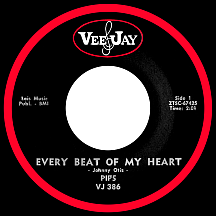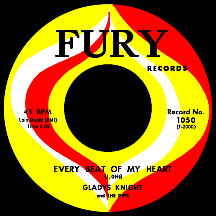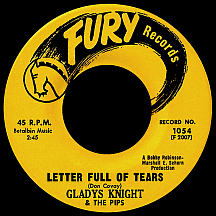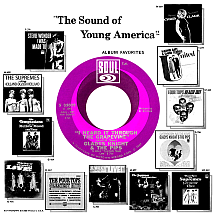GLADYS KNIGHT
AND THE PIPS
Gladys! A single name that can only have one meaning. Or can it? In recent years, Gladys Knight has been acclaimed as a "legendary" entertainer, while some have gone so far as to call her a "treasure" (as in living, national, American). But then, similar high praise could accurately describe Oscar-nominated British actress Gladys Cooper (Now, Voyager; My Fair Lady, TV series The Rogues), a star whose career stretched from the silents to the '70s. So before you go thinking there's only one famous Gladys...it just ain't so! Gladys George is known for a couple good movies...or 20! She kissed Bogie on the big screen, baby! All right, all right, I'm not saying the media is wrong; soul diva Knight has earned the accolades. Members of her family, known collectively as The Pips, are pretty special too, particularly her brother and two cousins (and a few other Georgia kinfolk if you count as far back as 1952), happy to let sis/cuz take the lead...and keep it for about four decades of music-making bliss. Besides, they never really had another choice...after all, she's Gladys!
In 1952, at the age of seven, Atlanta-born Gladys Maria Knight landed a spot on Ted Mack's Original Amateur Hour, TV's leading talent competition. Her singing captivated viewers, audience members and Mack, and a return trip to the series' yearly finals, taking place after her eighth birthday, netted her the top prize: two thousand bucks and a huge trophy almost as tall as she was. Shortly afterwards a vocal quintet was formed with her older brother Merald Knight (nickname: "Bubba"), sister Brenda Knight and cousins William Guest and Eleanor Guest. Another cousin, James Woods (nickname: "Pip"), went to work entering them in local singing contests; they named the group after him. A few years passed before they had a chance to make a record. "Ching Chong," recorded in Detroit with bandleader Maurice King and released in 1958 on Brunswick, led to a spot opening in concert for Jackie Wilson.
By the end of the decade, both Brenda and Eleanor had left the group to get married and raise children. Another cousin, Edward Patten, and a close friend, Langston George, replaced them, making lead vocalist Gladys the only female member. "Every Beat of My Heart," a ballad written by Johnny Otis, had been recorded originally by Hank Ballard's group The Royals for Federal in 1952; nine years later the Pips recorded a version in Atlanta for a small label, Huntom, and Woods leased the master to Chicago's Vee-Jay Records. The impatient young quintet headed to New York and auditioned for Bobby Robinson of Fire/Fury; he captured a new, stereo version of the song on a multitrack machine and got it out on Fury under the longer name Gladys Knight and the Pips in time to compete with the Pips' similar take. Both singles charted in the spring of 1961 and while the newer disc stalled just below the top 40, the VJ version went top ten pop and reached number one on the rhythm and blues chart.
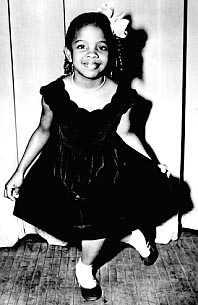
Robinson signed the group before Vee-Jay bosslady Vivian Carter could make a move, but the second single, a nice remake of Jesse Belvin's "Guess Who," went nowhere. "Letter Full of Tears," penned by Don Covay, brought the gladness back (in spite of its melancholy message) in the early months of '62, a top 20 pop and top ten R&B hit. By the time "Operator" arrived, Gladys had followed her female family members' leads, quitting the group to marry musician James Newman and start a family. The Pips ventured forth as an all-male foursome, releasing the Gladys-less "Linda," while a Fury single, "Come See About Me," was issued as a solo Gladys Knight effort. Langston George left for personal reasons around this time and the act, down to a trio, recorded "Happiness (Is the Light of Love)," issued on Everlast, a Fire/Fury offshoot. Vee-Jay put out an older Knight recording, "Queen of Tears," as a solo single. None of them clicked; Gladys might as well have put an "e" at the end of her name for all the good it did the Pips!
What if she had never returned? "Eleanor Guest and the Pips" just doesn't sound right (mainly because we're used to it the other way). But wait...Gladys got restless...and rejoined Bubba, Edward and William in time to take advantage of Van McCoy's talent; his moody "Giving Up" on Maxx Records returned them to the top 40 in July 1964. Gladys and the Pips sought the expertise of Cholly "Pops" Atkins, a longtime showbiz dancer who'd worked with several R&B groups in the '50s; he taught them dance steps that enhanced their stage presentation. Cholly had coached some of Motown's acts and in 1964 he was hired full time by the label. That's where Berry Gordy came into the Pips' picture; Hitsville's bossman had been keeping an eye on the Knight clan for some time and in 1966 he was ready to sign them to a contract. Motown then had two singers named Gladys (The Marvelettes were already in their fifth year of hitmaking happiness with lead singer Gladys Horton)!
The Harvey Fuqua-Johnny Bristol production "Just Walk in My Shoes" was far from a spectacular debut, but Gordy knew a thing or two about building momentum. Producer Norman Whitfield took over in '67 and each Soul label single posted a gradual upward movement; "Take Me in Your Arms and Love Me" landed them on the Hot 100 and "Everybody Needs Love" cracked the top 40. Whitfield began contemporizing his output beyond Gordy's "Motown Sound" formula, as he'd done with The Temptations a year earlier. The Pips let 'er rip on the Whitfield-Barrett Strong track "I Heard it Through the Grapevine," which capped the year at number two pop and number one R&B. The recording received a Grammy nomination...but it came with a preposterous twist, competing in the R&B Solo Female category. No Pips...no point!
Similar to the way Pete and Gladys were outsiders in Spring Byington's life (check out a December Bride rerun if you don't believe me!), Gladys Knight and the Pips felt like Motown had an "inner circle" they were not part of. In spite of their success, they still had to compete with the majority of the company's roster of homegrown talent cultivated within a development system Gordy had set up years before. Still, "The End of Our Road" and "It Should Have Been Me" were solid radio hits in '68...yet somehow, Marvin Gaye managed to overshadow their one major score with an even bigger hit version of "I Heard it Though the Grapevine" less than a year after the now-diluted coup!
Nick Ashford and Valerie Simpson stepped up next with "Didn't You Know (You'd Have to Cry Sometime)," then Whitfield employed some out-of-the-box thinking with a funked-up remake of Lincoln Chase's "The Nitty Gritty" (the tune that established Shirley Ellis five years earlier) and "Friendship Train" (a rhythmically raucus equivalent to the spiritual theme of The Impressions' "People Get Ready"); both went top 20 in '69, the latter landing them a Grammy nomination, correctly configured this time, in the R&B Group category.
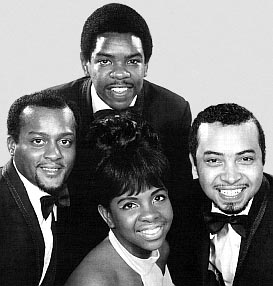
The 1970s was to be the decade for Detroit's hitmaking quartet from Atlanta, yet the first year passed quietly with one minor ballad, "You Need Love Like I Do (Don't You)." Then Gladys and the Pips landed back in the top ten thanks to Clay McMurray (nickname: "Butch"), who had produced several of the Motor City's well-kept soul secrets and one hit (Spyder Turner's "Stand By Me"); the moving "If I Were Your Woman" was cowritten by McMurray with Pam Sawyer and Gloria Jones (using the pen name LaVerne Ware). Bristol again took the helm with "I Don't Want to Do Wrong" and Kris Kristofferson's "Help Me Make it Through the Night" (a pop and country hit for Sammi Smith in '71, it was also interpreted from a male perpective by Gladys Presley's son Elvis).
In 1973, the group decided to leave Motown for Buddah Records, a company they felt might better prioritize the Pips' needs. Two more hits were posted at Motown, the Jim Weatherly ballad "Neither One of Us (Wants to Be the First to Say Goodbye)" and a Johnny Bristol-Bubba-Gladys composition, "Daddy Could Swear, I Declare." The Buddah phase began with two more Weatherly tunes, "Where Peaceful Waters Flow" and the chart-topping "Midnight Train to Georgia," which every kid growing up in the '70s memorized, whether or not they consciously meant to. Come Grammy time, the quartet emerged victorious on two counts, representing both record companies: Neither One" got the Pop Group statue and "Midnight Train" took the R&B Group award (they became Grammy favorites, racking up nine noms and one more win over the years, in addition to several more for the once-unthinkable solo Gladys Knight).
A string of mid-decade Buddah hits included "I've Got to Use My Imagination," "Best Thing That Ever Happened to Me" and "On and On." They took on a high-profile project produced by Curtis Mayfield, the soundtrack for the movie Claudine starring Diahann Carroll and James Earl Jones. NBC-TV gave them a trial run in the summer of '75 with The Gladys Knight and the Pips Show, a music-and-funny-skits series following the lead set by The Sonny and Cher Comedy Hour, Tony Orlando and Dawn and others, with brother Bubba often playing the comic foil (somewhat imitative of Sonny Bono's small screen buffoonery). The four-episode Pips experiment fell short in making the comedy routines work (posing no serious threat to the in-name-only legacy of Bewitched's fictional Gladys Kravitz, the sitcom world's quintessential busybody neighbor, played so wonderfully by Alice Pearce from 1964 to 1966).
More noteworthy was Gladys Knight's acting career, off to a great start with Pipe Dreams, for which she recieved a 1976 Golden Globe nomination for Best Acting Debut in a Motion Picture, Female. Other roles include her stint as Flip Wilson's wife on the mid-'80s NBC sitcom Charlie & Company. In 1986 she added another number one hit to her resumé with Dionne and Friends' "That's What Friends Are For" (palling around musically with Dionne Warwick, Elton John and Stevie Wonder). There was one big late-career hit for Gladys and her Pips in 1988, the Grammy-winning "Love Overboard," before the quartet, together as an unchanging unit for two-and-a-half decades, called it quits the following year.
Gladys Knight has since remained in the public eye through a series of solo recordings and collaborations, plus two dozen or more appearances in movies and television series episodes. A serious addiction to Casino Blackjack set her back hundreds of thousands of dollars; she eventually kicked the habit with the help of Gambler's Anonymous. In the late '90s she opened Glady's Knight's Chicken and Waffles restaurants, a small but popular Atlanta-area chain. Her loyal and extremely successful family act is unique as 20th century entertainers go. "Pips" has just one meaning to millions of people: the word represents the absolute best in supporting vocalists...and their lead singer's star power has surpassed all the other famous Gladyses!
NOTABLE SINGLES:
- Ching Chong - 1958
as the Pips - Every Beat of My Heart - 1961
as Pips - Every Beat of My Heart - 1961
- Guess Who - 1961
- Letter Full of Tears - 1962
- Operator - 1962
- Linda - 1962
as the Pips - I Want That Kind of Love - 1963
by Gladys Knight - Happiness (Is the Light of Love) - 1963
as the Pips - Queen of Tears - 1963
by Gladys Knight - Giving Up - 1964
- Lovers Always Forgive - 1964
- Either Way I Lose - 1964
- Stop and Get a Hold of Myself /
Who Knows - 1965 - Just Walk in My Shoes - 1966
- Take Me in Your Arms and Love Me - 1967
- Everybody Needs Love - 1967
- I Heard it Through the Grapevine - 1967
- The End of Our Road - 1968
- It Should Have Been Me - 1968
- Didn't You Know (You'd Have to Cry Sometime) - 1969
- The Nitty Gritty - 1969
- Friendship Train - 1969
- You Need Love Like I Do (Don't You) - 1970
- If I Were Your Woman - 1971
- I Don't Want to Do Wrong - 1971
- Make Me the Woman That You Go Home To - 1972
- Help Me Make it Through the Night - 1972
- Neither One of Us (Wants to Be the First to Say Goodbye) - 1973
- Daddy Could Swear, I Declare - 1973
- Where Peaceful Waters Flow - 1973
- Midnight Train to Georgia - 1973
- I've Got to Use My Imagination - 1973
- Best Thing That Ever Happened to Me - 1974
- On and On - 1974
- I Feel a Song (In My Heart) - 1974
- The Way We Were/Try to Remember - 1975
- Part Time Love - 1975
- That's What Friends Are For - 1986
by Dionne and Friends - Love Overboard - 1988
- Missing You - 1996
by Brandy, Tamia, Gladys Knight and Chaka Khan


